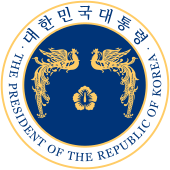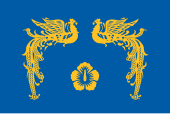President of the Republic of Korea
| President of the Republic of Korea | |

|
|
| Seal of the President | |

|
|
| Standard of the President | |
|
Acting President Moon Jae-in since May 10, 2017 |
|
| Official seat | Blue house |
| Term of office | 5 years (no re-election possible) |
| Last choice | May 9, 2017 |
| website | www.president.go.kr |
| Korean spelling | |
|---|---|
| Korean alphabet : | 대통령 |
| Hanja : | 大 統領 |
| Revised Romanization : | Daetongnyeong |
| McCune-Reischauer : | Taet'ongnyŏng |
The President of the Republic of Korea ( Korean : 대한민국 대통령 ) is the head of the state on the southern part of the Korean peninsula, which is also known as South Korea .
The incumbent president has been Moon Jae-in since May 10, 2017 . He won the early presidential election on May 9, 2017 , which became necessary after Park Geun-hye was removed from office on March 10, 2017 by the Constitutional Court.
position
According to the current constitution of October 29, 1987, the President of the Republic of Korea is the highest representative of the state and represents it abroad. He has the responsibility and the duty to preserve the independence, the territorial integrity and the continuity of the state. He also watches over the constitution.
Competencies and tasks
The president occupies a relatively strong position in the political system of the Republic of Korea. Among other things, it appoints and heads the government and can issue presidential ordinances in certain areas specified by law, which are necessary for the implementation of the laws. He is also the commander in chief of the military .
Among other things, the President has the following competencies and tasks:
- concludes and ratifies treaties
- accredits, receives or sends diplomats
- awards medals and other awards
- can appear at the National Assembly and give speeches and send messages to it in writing
- can submit important political matters relating to foreign policy, national defense, reunification and state security to a referendum if it deems it necessary
- appoints and dismisses civil servants in accordance with the Constitution and laws
- can order amnesty , mitigation and rehabilitation in accordance with the law
- is chairman of the State Council
- conducts the meetings of the State Security Council
- can declare war and make peace
- can issue ordinances with the character of a law in times of unrest, threats, emergencies or economic crises, but these must later be confirmed by the National Assembly in order to maintain their effectiveness
- can declare a state of war in times of war, armed conflict or threats to public security and must notify the National Assembly immediately
- has the duty to strive for the reunification of the fatherland
- He must write all of his legal acts in writing and submit them to the Prime Minister and the Cabinet of Ministers for countersignature
Election and term of office
The president is elected by the people in a general, equal, direct and secret ballot. The regular term of office is five years. Re-election is not possible. A successor must be elected between 40 and 70 days prior to the end of the incumbent president's term.
Any citizen who is eligible for election to the National Assembly and who is at least forty on the day of the election is eligible.
The candidate who received the most votes is considered elected. If two or more candidates receive exactly the same number of votes, they must stand for a second ballot in a public session of the National Assembly. The candidate who has received the most votes from the members of the National Assembly is then considered elected.
In the event of an early termination of the regular term of office, new elections must take place within 60 days.
Swearing in
Before taking office, the elected president must take the following oath :
“I solemnly swear before the people that I will comply with the constitution, defend the state, promote the peaceful reunification of the fatherland, promote the freedom and welfare of the people and strive to develop popular culture, and in this way I will faithfully fulfill the duties of the President. "
immunity
In principle, the President enjoys immunity from criminal prosecution throughout his entire term of office . The only exceptions are crimes related to riot or treason.
Vacancy and incapacity
If the office of President becomes vacant or if the latter is unable to exercise his powers and duties, the Prime Minister or the member of the Council of State determined in accordance with the order established by law shall temporarily exercise the office of President.
incompatibility
The President cannot simultaneously hold the post of Prime Minister, a member of the Council of State, the head of any of the ministries or any other public or private office.
Official
So far twelve people have held the office of president. The first incumbent from July 20, 1948 to May 3, 1960 was Rhee Syng-man . After Park Geun-hye , the first woman in this office, Moon Jae-in has been the incumbent since May 10, 2017 . The longest-serving president so far was Park Chung-hee , who took office on March 24, 1962 and was assassinated in office on October 26, 1979.
Official seat
The Blue House in the capital Seoul is the official seat and residence of the President.
Web links
- Official Website of the President (Korean, English)
- List of rulers of Korea - World Statesmen.org. Retrieved March 13, 2017 (English).
- Ruler List of Korea - Rulers.org. Retrieved March 13, 2017 (English).
